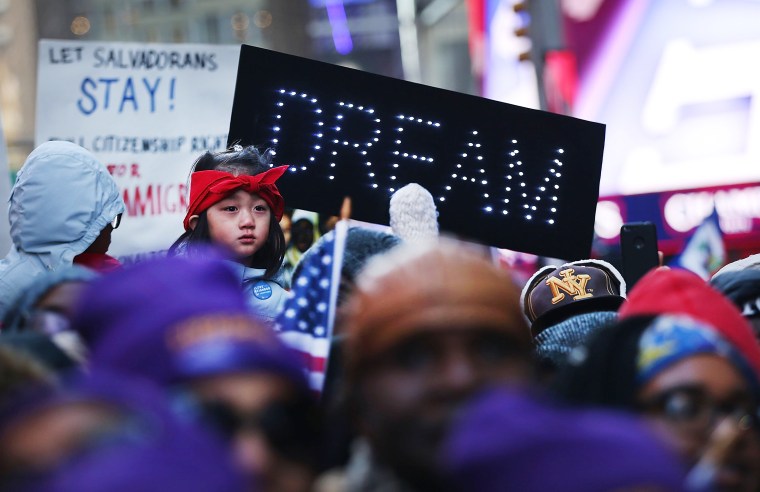It might be a while before congressional Democrats are ready to move forward with a comprehensive immigration bill, called the U.S. Citizenship Act. The negotiations over the details of the proposal are ongoing, and we probably won't see a floor vote for months.
But that doesn't mean legislating on the issue has to be put off altogether. NBC News reported yesterday on a pair of meaningful immigration measures that reached the House floor yesterday.
The House on Thursday passed an immigration bill that would create a pathway to citizenship for millions of "Dreamers" and passed another bill to allow green cards and overhaul protections for farmworkers.
The first bill, called the American Dream and Promise Act, is in line with the traditional Dream Act, which has been pending in Congress for over a decade. If approved, the bill would extend legal status and a pathway to citizenship for undocumented immigrants who entered the United States as minors. This passed yesterday, 228 to 197, with nine House Republicans siding with the Democratic majority.
The other measure, the Farm Workforce Modernization Act, would focus specifically on undocumented agricultural workers already in the United States, offering them a pathway to citizenship, while simultaneously taking steps intended to help American farms. This bill also passed, but by a slightly larger margin: 247 to 174, with 30 GOP lawmakers voting with Dems.
Given the state of the party, when 30 House Republicans vote for a Democratic immigration bill, it's a pleasant example of bipartisanship, even if 173 GOP members opposed it.
The White House issued a written statement this week in which President Joe Biden endorsed both measures, vowing to sign them if the bills reach his desk.
And you know what sentence is next. The proposals now head to the evenly divided Senate, where the bills will face -- let's all say it together -- inevitable Republican filibusters.
The Washington Post's editorial board published an item this week that asked the right questions.
Will enough GOP senators choose to represent the broad swath of Americans, including rank-and-file Republicans, who want a humane, rational future for young adults and teenagers eager to make their mark in this country? Or will they fall in line with a nativist minority, in thrall to former president Donald Trump, who reflexively oppose any steps toward inclusion for people who can be portrayed as "the other"? That's not just a choice on a discrete piece of legislation. It's a defining fork in the road for a party wrestling with its future.
Let's also note for historical context a detail that often goes overlooked: Republicans helped write the Dream Act. In the not-too-distant past, these protections for Dreamers were literally co-authored by leading GOP senators such as Orrin Hatch, John McCain, and Dick Lugar.
But as Republican politics has become radicalized, so too has the GOP's approach to immigration policy. Utah's Hatch, for example, helped write the Dream Act, but he nevertheless voted against it when it reached the Senate floor in 2010.
This year, Sen. Lindsey Graham (R-S.C.) signed on as an original co-sponsor of a new Dream Act, though he said yesterday he's prepared to vote against his own bill until the United States is "in control of the border," whatever that means.
The House immigration bills passed yesterday are exactly the kinds of measures that should earn Republican support. But they won't.
